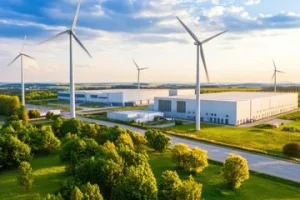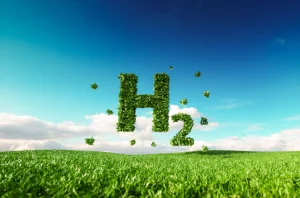How DC Power Supply Impacts the Efficiency of Hydrogen Electrolysers
If you’re planning or scaling a green hydrogen project, chances are you’re already thinking about electrolyser technologies, renewable integration, and project economics. But here’s something just as crucial—often overlooked until performance issues arise: the DC power supply.
In any green hydrogen plant, the efficiency, stability, and lifespan of your hydrogen electrolyser are tightly connected to the quality and design of its DC power supply. It’s not just about converting AC to DC—it’s about delivering precise, efficient, and stable power under variable conditions. Get this part wrong, and your entire hydrogen system could be underperforming or even failing.
In this blog, we’ll cover:
✅ Why DC power supply matters for hydrogen electrolysers
✅ How power quality affects hydrogen production efficiency
✅ What components define a high-quality DC power supply system
✅ Real-world technical considerations and benchmarks
✅ How YonderH2 is enabling scalable hydrogen production with tailored power solutions
Let’s get started.
Why the DC Power Supply is at the Heart of Hydrogen Production
At the core of every green hydrogen electrolyser is the process of electrolysis—splitting water into hydrogen and oxygen using electricity. This process requires a high-current, low-voltage DC input. But electricity from the grid or renewable sources comes in AC form.
To make that electricity usable for electrolysers, we need a specialized DC power supply system that includes:
Transformers
- Rectifiers
- Power electronics like IGBT converters
- Control and protection systems
The purpose of this setup is to:
- Convert AC to DC efficiently
- Regulate voltage and current precisely
- Reduce harmonics and ripple that damage electrolyser cells
- Adapt to variable loads from renewables or grid instability
In short, the DC power supply isn’t just a plug-in component—it’s the lifeline of your hydrogen system.
What Makes a Good DC Power Supply for Hydrogen Electrolysers?
Designing a DC power supply for hydrogen electrolysis isn’t a one-size-fits-all job. Requirements vary depending on:
- Type of electrolyser (PEM vs Alkaline)
- Plant size (kW to 100+ MW)
- Grid quality or renewable integration
- Regulatory requirements (like IEEE 519)
But across the board, a high-performance DC power supply should offer:
1. Stable, Low-Ripple DC Output
Hydrogen electrolysers are sensitive to voltage fluctuations and current ripple, which can reduce cell efficiency and lifespan. That’s why IGBT converters, like those offered by YonderH2, are preferred—they provide high-frequency switching that ensures a smooth, controlled DC output.
2. High Efficiency
Energy loss during conversion directly impacts the overall efficiency of hydrogen production. A 2% increase in power conversion efficiency can lead to significant OPEX savings in MW-scale plants.
Modern IGBT-based systems achieve over 98% conversion efficiency, minimizing waste and maximizing hydrogen output per kilowatt.
3. Power Factor Correction and Harmonic Control
Poor power factor and high harmonic distortion not only lower system efficiency but may also violate grid codes. YonderH2’s power systems are engineered to meet IEEE 519 and IEC 61000 standards, helping you maintain compliance and avoid utility penalties.
4. Scalability and Modularity
As green hydrogen projects scale, power systems must be modular, allowing for easy expansion without complete redesign. Modular IGBT converters enable scaling from 1 MW to 100+ MW, with redundant architecture for high availability.
Real-World Technical Insights: What Do Hydrogen Electrolysers Need?
Different electrolysers have different DC power requirements. Let’s take a look at some typical specs:
Electrolyser Type | Voltage Range | Current Range | Recommended Power System
PEM (1–5 MW) | 350–500 V | 2000–10,000 A | IGBT converter + transformer
Alkaline (10–100 MW) | 500–1000 V | 10,000–100,000 A | Multipulse thyristor or IGBT system
Solid Oxide (emerging) | 700–1000 V | Variable | High-voltage, low-current systems
PEM (1–5 MW) | 350–500 V | 2000–10,000 A | IGBT converter + transformer
Alkaline (10–100 MW) | 500–1000 V | 10,000–100,000 A | Multipulse thyristor or IGBT system
Solid Oxide (emerging) | 700–1000 V | Variable | High-voltage, low-current systems
As projects scale into tens or hundreds of megawatts, power quality and efficiency can make or break the economics.
The Integration Loop: Renewables, Grid, and Hydrogen
When hydrogen production is powered by renewable energy like solar or wind, additional complexity arises:
- Power generation is intermittent and non-linear
- Voltage and frequency may fluctuate
- Grid instability needs to be filtered
That’s where smart power electronics come in. YonderH2’s advanced IGBT converters provide fast switching, dynamic control, and feedback-based load matching, ensuring consistent hydrogen output, even when renewables vary.
The Hidden Cost of Poor DC Power Supply Design
What happens when the DC power supply is not optimized?
- Electrolyser efficiency drops by 3–5%, increasing the cost per kg of hydrogen
- System components overheat or degrade faster
- Unexpected shutdowns lead to hydrogen production loss
- Maintenance costs skyrocket due to wear and ripple damage
Industry studies show that power supply-related inefficiencies can increase hydrogen production cost by up to $0.30 per kg, a significant blow to project ROI.
How YonderH2 Solves the DC Power Challenge
At YonderH2, the focus isn’t just on making components—it’s about creating integrated, high-performance power solutions tailored for hydrogen plants.
Here’s what sets YonderH2 apart:
- Custom-engineered IGBT converters for high-current, low-voltage hydrogen applications
- Smart control systems with real-time diagnostics and thermal protection
- Modular architecture for scalability and redundancy
- Optimized designs for grid-connected and renewable-powered systems
- Decades of expertise in industrial rectification and power electronics (part of Ador Group)
So whether you’re building a 1 MW pilot or a 100 MW commercial plant, YonderH2 delivers the backbone that your electrolyser needs to perform at its best.
Frequently Asked Questions (FAQs)
🔹 What’s the difference between a rectifier and a DC power supply?
A rectifier is a key part of a DC power supply, converting AC to DC. A DC power supply includes rectifiers, converters, transformers, and control systems to deliver stable, regulated DC power to hydrogen electrolysers.
🔹 Why is ripple control important in the DC supply for hydrogen?
A Ripple in voltage or current can reduce the efficiency and lifespan of electrolyser cells. Low-ripple DC output ensures consistent hydrogen production and reduces maintenance costs.
🔹 Can I use standard industrial rectifiers for electrolysers?
No. Electrolysers require high-current, precision-controlled DC that standard rectifiers may not deliver. Purpose-built systems like YonderH2’s IGBT converters are designed for hydrogen applications.
🔹 How does YonderH2 support renewable-powered hydrogen systems?
YonderH2’s power supplies are designed to work with intermittent sources like solar and wind. Their converters feature real-time load matching, ensuring stable output despite variable input.
🔹 What standards should my DC power system meet?
Your system should comply with IEEE 519, IEC 61000, and any local grid codes for harmonics, power factor, and EMC compatibility.
Final Thought: The Power Behind Every Hydrogen Molecule
When people talk about green hydrogen, they often mention electrolyser brands or hydrogen purity. But what really determines how efficiently you produce hydrogen? It’s the quality of your DC power supply.
From ripple reduction and harmonic control to real-time adaptability and MW-scale efficiency, every part of your DC system shapes the performance and reliability of your hydrogen plant.
That’s why more hydrogen projects are choosing YonderH2 for their power needs. Backed by years of industry experience and engineering expertise, YonderH2 delivers fit-for-purpose IGBT converters and rectifier systems that turn power into performance.
Their solutions aren’t just components—they’re the critical engine that fuels green hydrogen’s future.
Ready to Power Up Your Hydrogen Efficiency?
If you’re planning a hydrogen project or scaling up production, your power supply should work as hard as your electrolyser.
Explore YonderH2’s range of advanced IGBT converters and power solutions tailored for green hydrogen production at yonderh2.com.
Let’s talk about your project.
Contact our team today to get started with a custom-engineered power system that meets your efficiency goals.




